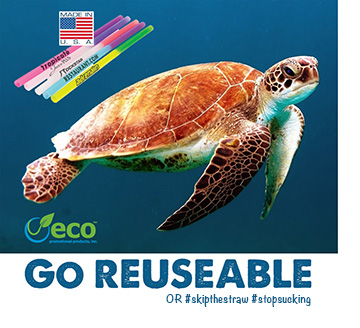Beyond the Bag: Groups Fighting to Ban Disposable Plastic Utensils & Straws; Going Strawless in September
One of the most wasted plastic items is something that’s actually not needed at all. When it comes to consuming beverages, straws are completely unnecessary except for a small number of people with certain medical conditions. According to the National Park Service, Americans alone use 500 million straws daily.
When research exposed the negative environmental impact of producing single-use plastic bags and the harm they do to everything from wildlife to plumbing when discarded, an international movement of plastic bag bans began. Continued research has shown disposable plastic utensils and straws are causing similar damage. A 2015 viral video showing scientists removing a straw embedded in a sea turtle’s nose brought awareness to the negative affect straws have on marine life.
While straws are typically made of recyclable plastic, most materials recycling facilities are unable to process straws for recycling due to their small size.
Now environmental organizations, conservation groups and municipalities across the country are working to ban disposable utensils and straws. Starting July 1, 2018, eateries in Seattle will no longer be able to dispense single-use plastic items. Bars, restaurants, cafes and any other establishment serving food, will have to switch to compostable utensils and straws or offer reusables.
In advance of the city’s ban, in September various organizations in Seattle will participate in the “Strawless in Seattle” campaign. The Seattle Seahawks, Seattle Mariners, Seattle Aquarium and Sea-Tac Airport among others are going straw-free during various dates in September. The Seattle Aquarium has even created a hashtag to raise awareness to the wastefulness of straws: #StopSucking.
Like the Seattle Aquarium, their counterparts across the U.S. have committed to reducing waste from plastic utensils and straws. The Seattle Aquarium, along with 18 other aquariums formed the Aquarium Conservation Partnership (ACP) to raise awareness and help reduce plastic pollution. All participating aquariums removed plastic straws and single-use carryout plastic bags from their facilities.
As a consumer, what can you do? The easiest thing of course, is to stop using disposables. Bring your own silverware to work to eat your lunch. Keep a spare set in a desk drawer for the days you forget. Pack reusable silverware in kids’ lunches. Skip the straw when dining out. Tell restaurant servers you do not need a straw before they bring one. When ordering take-out, decline plastic utensils. If you must drink out of a straw or it’s your preference, choose compostable paper or invest in reusable straws. Eco Promotional Products offers reusable drinking straws that are BPA free, American made and dishwasher safe. These heavy-duty plastic straws have an imprint that is laser engraved so it does not rub off and there is no ink contact with liquids or mouth. Stainless steel straws are also becoming more readily available. With a straw cleaning brush, stainless straws are easy to keep clean and can last a lifetime.



